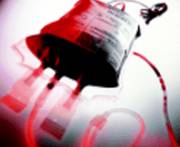 A 76 year old man with a history of coronary artery disease, diabetes and hypertension was brought in by his wife with two days of lethargy, slurred speech and right arm weakness. On presentation, the patient was awake and intermittently involved in conversation. Â He was afebrile, with a pulse of 90 and blood pressure of 166/98 Â His exam was remarkable for dysarthria, orientation only to person, pinpoint pupils, left sided tongue deviation, 3/5 motor strength in the right upper extremity, 4/5 motor strength in the proximal right lower extremity and right sided hyperreflexia. Â Â A non-contrast head CT revealed an acute left thalamic hemorrhage with surrounding edema and midline shift. Â Â The patient was evaluated by neurosurgery, but given the location of the bleed, no surgery was indicated. Â Â Platelet transfusion was recommended, as the patient had medication induced platelet dysfunction. Â The patient’s wife refused platelet transfusion as the patient was a long-standing Jehovah’s Witness. Â She had a copy of his Advanced Directives in which she was appointed the health care proxy and it was clearly outlined that he would not accept any blood product transfusion. Â An ethics consultation was requested.
A 76 year old man with a history of coronary artery disease, diabetes and hypertension was brought in by his wife with two days of lethargy, slurred speech and right arm weakness. On presentation, the patient was awake and intermittently involved in conversation. Â He was afebrile, with a pulse of 90 and blood pressure of 166/98 Â His exam was remarkable for dysarthria, orientation only to person, pinpoint pupils, left sided tongue deviation, 3/5 motor strength in the right upper extremity, 4/5 motor strength in the proximal right lower extremity and right sided hyperreflexia. Â Â A non-contrast head CT revealed an acute left thalamic hemorrhage with surrounding edema and midline shift. Â Â The patient was evaluated by neurosurgery, but given the location of the bleed, no surgery was indicated. Â Â Platelet transfusion was recommended, as the patient had medication induced platelet dysfunction. Â The patient’s wife refused platelet transfusion as the patient was a long-standing Jehovah’s Witness. Â She had a copy of his Advanced Directives in which she was appointed the health care proxy and it was clearly outlined that he would not accept any blood product transfusion. Â An ethics consultation was requested.
Questions:
1. From an ethical and legal standpoint how should a physician handle these situations?
2. If the patient can indicate that he wishes to accept platelets at this time, should his Advanced Directives be disregarded?
3. Would the situation be different if the patient were a minor and the parent’s refused transfusion?
-Alana Choy-Shan PGY-3
Commentary By: Sathya Mahaswaren, MD Integrated Ethics Program Coordinator, VA New York Harbor Healthcare System
The care of Jehovah’s Witnesses raises ethical issues when a competent patient’s religious freedom and autonomy to refuse a treatment conflicts with the physician’s commitment to provide beneficial care while avoiding harm. Physicians should take care to avoid coercion and deception that can deny patient’s autonomy and can result in charges of battery.
While evaluating the need for transfusion in a Jehovah’s Witness, consider the following:
Determine whether the patient still believes in Jehovah’s Witness teachings. A Jehovah’s Witness family cannot force their religious views upon the patient  Patients have changed their mind to undergo transfusion in the absence of a church or family member. Hence discussion with a competent patient regarding transfusion should take place in private. If a patient does change his or her mind the physician needs to assess if this change might be a consequence of illness impairing the patient’s capacity to decide. If the Jehovah’s Witness lacks decision making capacity look to see if the patient has completed an advance directive that can guide the decision-makers. Most Jehovah’s Witnesses carry advance directive cards that explicitly document the individual’s refusal of blood transfusion under any circumstances. Make sure that the patient is basing their decisions on specific facts. The Watchtower lists all unacceptable blood and blood products, and non-blood alternatives that could be used as a substitute for blood.
In the case of adult patients the courts have consistently supported the right to refuse blood on religious grounds.  Refusal to treatment is protected by the First Amendment and state constitutional guarantee of religious freedom. The common law of NY State established the right of a competent adult to determine the course of his or her own medical treatment in 1914.(Schloendorff v. Society of N.Y. Hosp., 211 N.Y. 125, 129-130, 105 N.E. 92). This right has been adopted and preserved by the Legislature (Public Health Law §§ 2504, 2805-d)
On November 5, 1990 the United States passed the Federal Patient Self-Determination Act. This act requires that healthcare providers inform patients regarding their right to determine the extent of care they receive and the right to have their decisions respected by heath care personnel. Treatment even if deemed by physicians to be life saving, may not be performed on competent patients without their consent.
The law is quite clear regarding transfusing minors. Lifesaving transfusions can be given to minors against parental wishes. In such cases proceed by acknowledging the parent’s wishes and informing the parents of the physician’s responsibility to notify the child welfare authorities (agencies are obligated to provide administrative consent for treatment) and to transfuse the child in an emergency as required by law. Consultation with legal counsel is advisable in such cases.
A physician’s principal liability lies in the failure to inform a patient fully of the potential consequences of refusal of treatment and failure to provide alternatives that may be available. All such conversations should be fully documented in the patient’s medical record.
